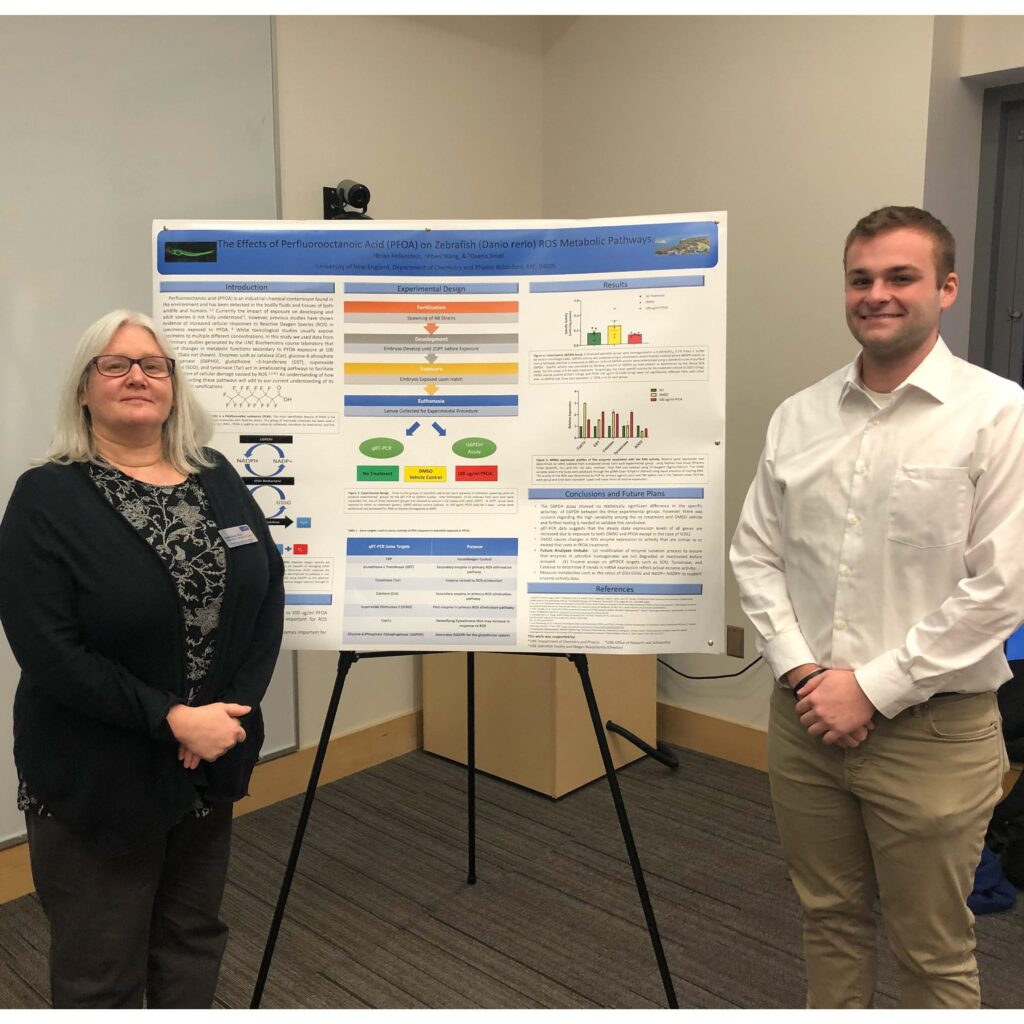
UNE undergraduate Brian Fellenstein (Medical Biology ’20), presented a research poster entitled “The Effects of Perfluorooctanoic acid (PFOA) on Zebrafish ROS Metabolic Pathways” at the first ever Maine Zebrafish Symposium held on February 8, 2020 at Bates College in Lewiston, Maine.
PFOA is an industrial chemical used in the manufacture of non-stick coatings and fire-fighting foams. PFOA waste is an environmental contaminant that is also detected in bodily fluids and tissues of wildlife and humans, although its effects on developing and adult animals is still relatively unknown. Brian found that PFOA induced the expression and activity of several enzymes used to combat PFOA-induced production of detrimental reactive oxygen species in zebrafish larvae. Brian began this research while enrolled in the Fundamentals of Chemistry laboratory course during the Spring, 2019 semester and continued until COVID-19 restrictions limited his access to UNE research labs in March. However, he has continued work on a manuscript reporting his data with his research mentors Deena J. Small, Ph.D. (Associate Professor of Chemistry) and Yiben Wang, Ph.D. (Assistant Teaching Professor of Chemistry). Brian’s study will help identify health risks associated with exposure to this prevalent environmental contaminant.
At the symposium, UNE Chemistry faculty Deena J. Small and Yiben Wang also presented their work on the use of zebrafish as an educational tool in a poster entitled “Go Fish: Increasing Student Engagement and Performance in Biochemistry Laboratory Learning Outcomes Through the Use of Fluorescent Zebrafish”. In an effort to increase student engagement and performance on learning outcomes in the Fundamentals of Biochemistry laboratory, Drs. Small and Wang redesigned the laboratory curriculum as a Course Undergraduate Research Experience (CURE) since this pedagogy in an effort to improve student interest, critical thinking skills, and scores on content-related assessments. The CURE project required students to generate and test hypotheses related to the effects of the environmental contaminant perfluorooctanoic acid (PFOA) on the metabolism of zebrafish larvae. They report that student scores on assessment and post-course surveys indicated that student engagement and comprehension of the scientific method and did improve after implementation of the CURE-based modules. Although COVID-19 negatively impacted student ability to finish these projects during the Spring, 2020 semester, students were able to continue to complete manuscripts reporting their original research using Zoom-based technology.
Both projects were supported by funds provided by UNE’s Department of Chemistry and Physics, the Office of Research and Scholarship and the Center for Excellence in Teaching and Learning. Technical support was also provided by the UNE Zebrafish Education and Research Facility.
Picture Caption: Associate Professor of Chemistry Deena J. Small, Ph.D. (left) and UNE undergraduate Brian Fellenstein (Medical Biology, ’20, right) with their poster that was presented at the Maine Zebrafish Symposium held at Bates College on February 8, 2020.
